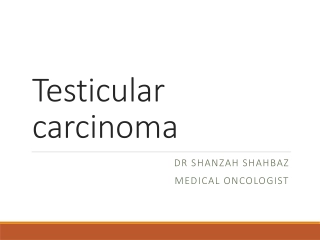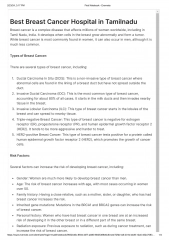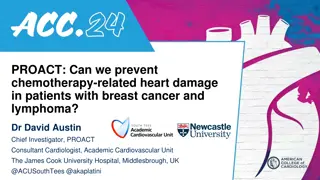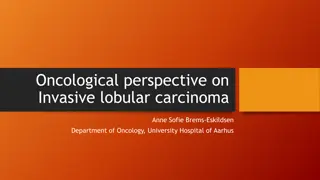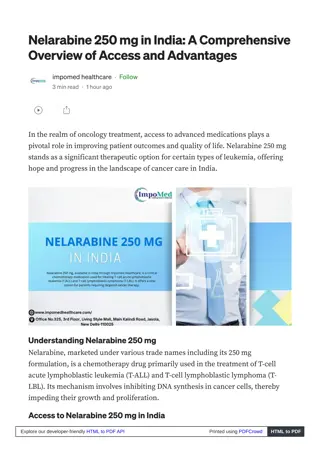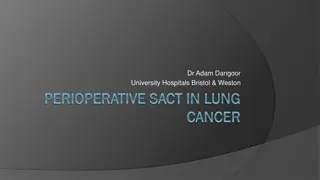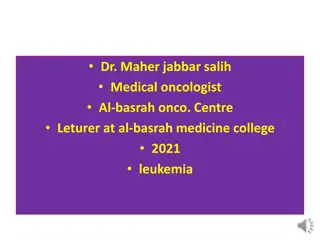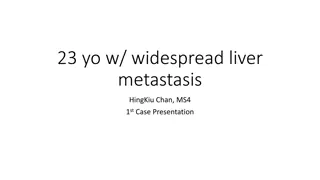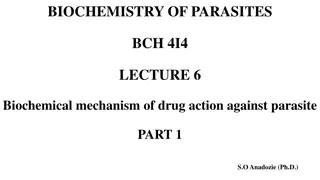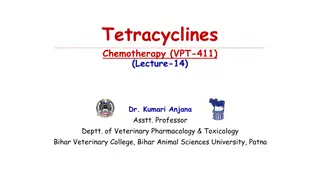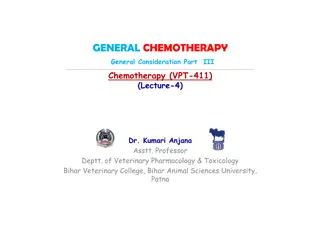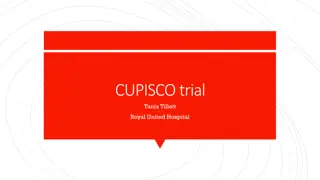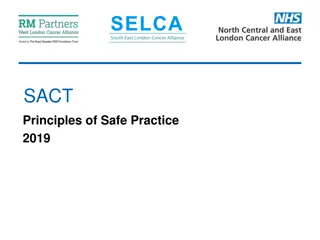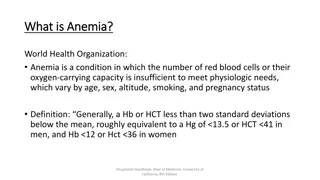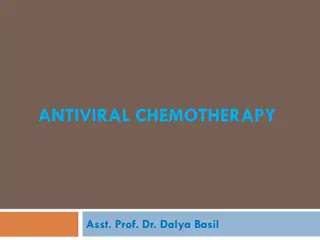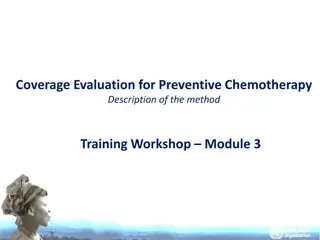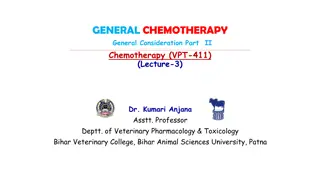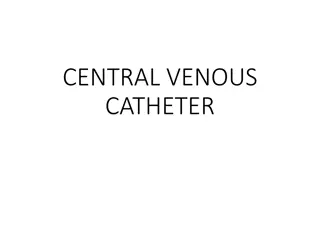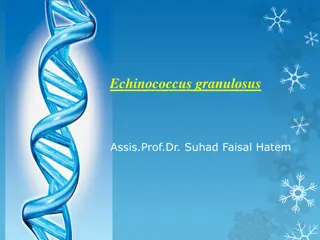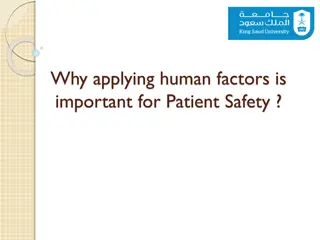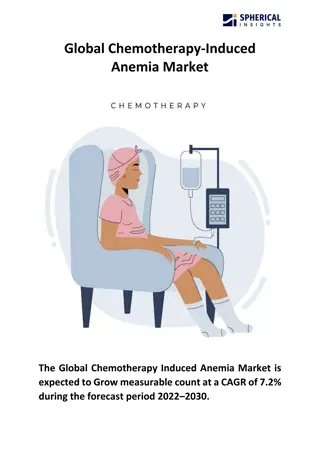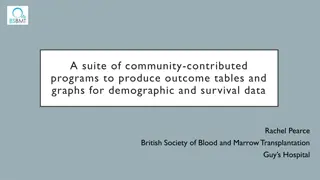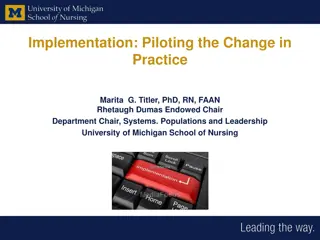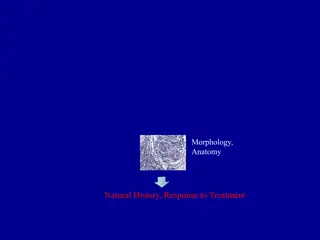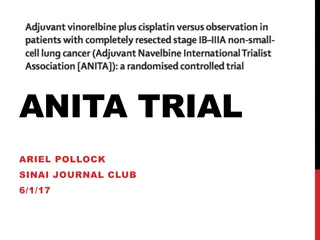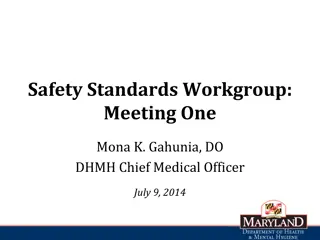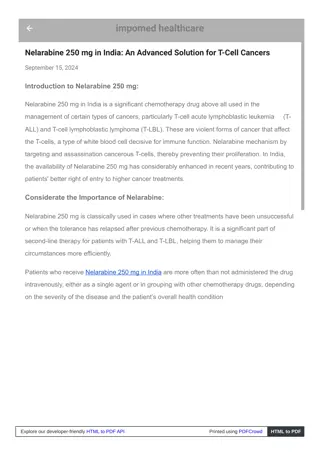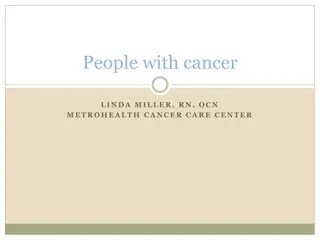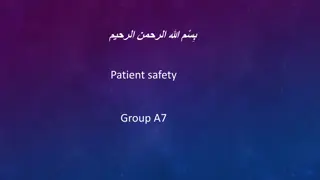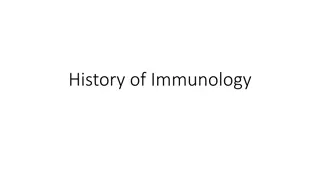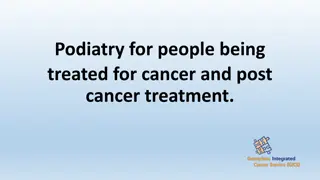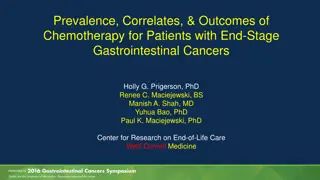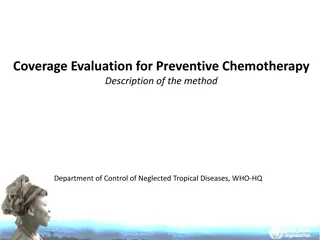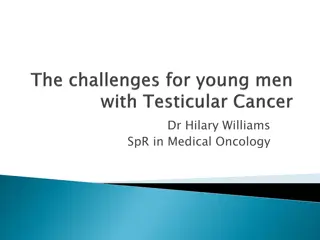Testicular carcinoma
The diagnosis and treatment options for testicular carcinoma from Dr. Shanzah Shahbaz, a medical oncologist. This comprehensive guide covers staging, tumor markers, false elevation risks, chemotherapy regimens, and management of residual masses.
2 views • 15 slides
Best Breast Cancer Hospital in Tamilnadu
One of the top hospitals for breast cancer treatment in Tamil Nadu is the Hospitals in Chennai. With a dedicated breast cancer clinic, it offers comprehensive care including advanced diagnostics, surgery, chemotherapy, and radiation therapy. The hospital boasts a team of experienced oncologists, sur
3 views • 4 slides
Nucleic Acids Overview
Delve into the intricate world of nucleic acids with a focus on DNA and RNA structures, DNA replication, RNA transcription, protein biosynthesis, cancer/chemotherapy, genetic engineering, and more. Explore the structures of bases, sugars, nucleosides, nucleotides, and parts of nucleotides, along wit
8 views • 58 slides
Prevention of Chemotherapy-Related Heart Damage in Breast Cancer and Lymphoma Patients: PROACT Study
Dr. David Austin leads the PROACT study aiming to prevent chemotherapy-related heart damage in breast cancer and lymphoma patients using the ACE inhibitor enalapril. The research focuses on the effectiveness of enalapril in mitigating anthracycline cardiotoxicity, crucial for reducing long-term impa
3 views • 19 slides
Oncological Perspective on Invasive Lobular Carcinoma: Challenges and Response to Chemotherapy
Guidelines and characteristics of invasive lobular carcinoma, focusing on oncological challenges, response to chemotherapy, and prognosis after neo-adjuvant treatment in patients. Highlights the importance of considering histology type for tailored treatment decisions. Discusses the effectiveness of
0 views • 20 slides
The Role of Gemtuzumab 4.5 mg in Precision Oncology
\n\nGemtuzumab 4.5 mg is a monoclonal antibody that targets CD33 antigen, which is found on the surface of leukemia cells. In precision oncology, this drug has been used to treat patients with acute myeloid leukemia (AML) who are deemed appropriate for this therapy. It has been shown to increase sur
1 views • 3 slides
Know All About Primary Ovarian Insufficiency (POI)
Understanding the causes, identifying the symptoms, and analyzing available therapies are important for managing this difficult reproductive health issue effectively. Reasons for Premature Ovarian Failure include various elements, including genetic abnormalities, autoimmune disorders, chemotherapy,
0 views • 7 slides
Information regarding the availability of Nelarabine 250 mg in India
Having accurate information on the availability of Nelarabine 250 mg is crucial. This chemotherapy drug is essential for treating T-cell acute lymphoblastic leukemia (T-ALL) and T-cell lymphoblastic lymphoma (T-LBL). At Impomed Healthcare, we strive to ensure that patients and healthcare providers h
0 views • 10 slides
Advances in Perioperative Treatment of Lung Cancer: A Comprehensive Review
Explore the evolution of perioperative treatment for lung cancer from historical perspectives to current advancements. Learn about the efficacy of different chemotherapy agents, immunotherapies, and adjuvant treatments, along with the impact on patient outcomes and resectability criteria. Discover t
1 views • 19 slides
Understanding Leukemia: Causes, Types, and Treatment Options
Leukemia is a group of blood disorders characterized by abnormal white blood cell production. Factors like genetics, environment, and mutations in DNA play a role in its development. Acute leukemia requires urgent treatment due to rapid cell growth, while chronic leukemia progresses more slowly. The
1 views • 20 slides
Case Study: Pancreatoblastoma with Liver Metastasis in a 23-Year-Old Pregnant Female
A 23-year-old pregnant female presents with abdominal pain, leading to the diagnosis of pancreatoblastoma with liver metastasis. Initial biopsy and imaging confirm the presence of high-grade carcinoma, with treatment involving chemotherapy and stem cell transplant. CT features and a differential dia
0 views • 12 slides
Understanding Biochemical Mechanisms of Drug Action Against Parasites
Parasitic protozoa cause devastating diseases in humans and animals, and chemotherapy is the primary defense. Drug resistance is a challenge, and prevention is crucial. Modern tools aid in studying genetic and biochemical aspects, targeting the parasite selectively. Drugs act by interfering with spe
1 views • 15 slides
Understanding Tetracyclines: Chemistry, History, and Applications
Tetracyclines are a group of natural and synthetic antibiotics with a unique chemical structure and broad-spectrum antimicrobial activity. They were first discovered through soil microorganism screening and have since become a cornerstone in modern chemotherapy. This chapter delves into their introd
0 views • 31 slides
Ideal Antimicrobial Agents and Antimicrobial Classification Overview
This lecture on general chemotherapy outlines the properties of ideal antimicrobial agents, emphasizing selective and effective activity, bactericidal action, non-toxicity, and more. It also covers the classification of antimicrobials based on chemical structure, including sulfonamides, diaminopyrim
6 views • 19 slides
Molecularly-Guided Therapy vs Platinum Chemotherapy in CUP Patients
This trial aims to compare the efficacy and safety of molecularly-guided therapy or cancer immunotherapy based on genomic profiling with platinum-based chemotherapy in patients with cancer of unknown primary site. The study design includes multiple treatment regimens guided by genomic profiles, with
4 views • 9 slides
Safe Practice Principles for Systemic Anti-Cancer Therapy (SACT) 2019
Systemic Anti-Cancer Therapy (SACT) involves chemotherapy and targeted agents for cancer treatment. Risks include errors with non-accredited staff, incomplete prescriptions, incorrect dosing, and patient education deficiencies. Safe practice principles emphasize specialist care, established protocol
0 views • 25 slides
Understanding Anemia: Causes, Mechanisms, and Classifications
Anemia is a condition characterized by a deficiency in red blood cells or their oxygen-carrying capacity, impacting physiological needs. Causes include blood loss, decreased production, and destruction of red blood cells. There are various classifications such as acute and chronic blood loss anemia,
0 views • 19 slides
Understanding Antiviral Chemotherapy: Importance and Types
Antiviral chemotherapy plays a crucial role in preventing and treating viral infections, especially when public health measures and vaccines are not sufficient. This form of treatment has been successful in combating diseases like HIV by inhibiting viral replication and targeting specific functions
1 views • 34 slides
Analysis and Interpretation of Preventive Chemotherapy Coverage Evaluation Results
This module focuses on the analysis and interpretation of results from preventive chemotherapy coverage evaluation surveys. It includes estimating program coverage, interpreting program reach, and identifying factors affecting coverage levels such as supply chain issues and social mobilization. The
8 views • 22 slides
History of Chemotherapy: From Empirical Use to Modern Era
The history of chemotherapy is divided into three phases, starting from the empirical use of compounds in ancient times to the modern era marked by targeted drug development. Ehrlich's pioneering work in the late 19th to early 20th centuries laid the foundation for understanding the selective toxici
0 views • 15 slides
Central Venous Catheters: Uses, Placement, and Indications
A central venous catheter (CVC) is a crucial medical device placed into a large vein for various purposes like administering medication, fluids, and obtaining blood tests. The catheter can be tunneled or non-tunneled, and specific sites are preferred for each type. Indications for CVC usage include
1 views • 19 slides
Understanding Echinococcus Granulosus and Hydatid Disease
Echinococcus Granulosus, also known as the hydatid worm or dog tapeworm, causes cystic echinococcosis. The tapeworm has distinct characteristics and a complex life cycle involving canids as definitive hosts and humans as accidental hosts. Hydatid disease in humans can be dangerous, with symptoms var
0 views • 8 slides
Importance of Human Factors in Patient Safety: A Pharmacy Technician's Deadly Mistake
Applying human factors is crucial for patient safety, as demonstrated by the tragic case of Emily Jerry, a two-year-old girl who lost her life due to a pharmacy technician's deadly mistake in preparing a chemotherapy solution. The oversight and miscommunication between healthcare professionals led t
0 views • 13 slides
Understanding Echinococcosis: Symptoms, Transmission, and Treatment
Echinococcosis, a zoonotic disease caused by tapeworm parasites, has various forms such as cystic and alveolar echinococcosis. The disease is transmitted to humans through contaminated soil, water, or food. Diagnosis involves imaging techniques and serologic tests. Treatment options include surgery,
0 views • 9 slides
Global Chemotherapy Induced Anemia Market
The Global Chemotherapy Induced Anemia Market Size is expected to reach USD 3.99 billion by 2030, at a CAGR of 7.2% during the forecast period 2021 to 2030.\n
1 views • 4 slides
Community Programs for Outcome Data Analysis in Stem Cell Transplantation
A suite of community-contributed programs is utilized by the British Society of Blood and Marrow Transplantation at Guy's Hospital to analyze demographic and survival data related to stem cell transplantation. The programs aim to produce outcome tables and graphs that aid in retrospective studies, i
0 views • 13 slides
Dietary Restrictions in Neutropenic Oncology Patients
The project explores the impact of restricting fresh fruits and vegetables intake on cancer patients undergoing myelosuppressive chemotherapy. Despite common practice, evidence supporting dietary restrictions is lacking. The study aims to determine if such restrictions truly prevent infections and i
0 views • 32 slides
Precision Oncology and Genomic Changes in Cancer Treatment
Explore the intricate details of cancer treatment through precision oncology, focusing on cell of origin, genomic changes, tumor microenvironment, host factors, and response to various treatments such as chemotherapy, biological therapy, and immune therapy. The natural history and histology-guided c
0 views • 9 slides
Adjuvant Therapies in Early Stage NSCLC: A Review
Examining the role of adjuvant therapies in stage IB-IIIA non-small cell lung cancer (NSCLC) post-surgery. Discussion includes the impact of chemotherapy and radiation therapy on overall survival rates and the historical context of adjuvant treatment decisions. Management strategies and consideratio
0 views • 30 slides
National Safety Standards for Oncology and Rheumatology Therapies
The Safety Standards Workgroup is tasked with studying and developing national safety standards for handling chemotherapy, biologic therapy, and other treatments for cancer, rheumatology, and blood conditions. Issues such as accurate dosing, infection control, and occupational safety risks are highl
0 views • 24 slides
Nelarabine 250 mg in India: A Crucial Chemotherapy for T-cell Leukemia and Lymph
This PDF provides an in-depth overview of Nelarabine 250 mg, a vital chemotherapy drug used for treating aggressive cancers like T-cell acute lymphoblastic leukemia (T-ALL) and T-cell lymphoblastic lymphoma (T-LBL) in India. Learn about Nelarabine 25
0 views • 4 slides
Understanding Cancer Treatments and Side Effects
Explore the different modes of cancer treatment including surgery, radiation, and chemotherapy. Learn about the side effects of therapy such as fatigue, nausea, and skin issues. Discover how advancements like oral chemotherapy are changing the landscape of cancer care and the precautions needed to h
0 views • 23 slides
Tragedy Caused by a Pharmacy Technician's Deadly Mistake
Emily Jerry, a two-year-old cancer patient, passed away due to a pharmacy technician's fatal error in preparing a chemotherapy solution with excessive salt concentration. Despite warnings, the dose was administered incorrectly, leading to Emily's death. The pharmacist, Eric Cropp, faced legal conseq
0 views • 10 slides
Pioneers of Immunology: Jenner, Ehrlich, and Metchnikoff
Edward Jenner initiated the concept of vaccination by discovering that cowpox could confer immunity to smallpox. Paul Ehrlich differentiated blood cells, proposed the side chain hypothesis, and pioneered serum therapy and chemotherapy. Elie Metchnikoff developed the cellular theory of immunity, advo
0 views • 4 slides
Importance of Foot Care in Cancer Treatment
Engaging in exercise has shown to reduce cancer mortality and recurrence rates, with foot care playing a crucial role. Patients undergoing cancer treatment may experience foot problems such as Chemotherapy Induced Peripheral Neuropathy (CIPN), nail changes, and skin issues. Proper foot care is essen
0 views • 11 slides
Chemotherapy Utilization in End-Stage Gastrointestinal Cancer Patients
This presentation explores the prevalence, correlates, and outcomes of chemotherapy use in patients with end-stage gastrointestinal cancers. Data is presented on the frequency of chemotherapy administration, correlates, harms, and benefits in patients in their final months of life. Insights from stu
0 views • 21 slides
Chemotherapy for Brain Cancer Understanding the Options
Chemotherapy is a cancer treatment that uses drugs to kill cancer cells with Neuro Surgery oncology. These drugs can be administered intravenously, orally, or directly into the brain. The goal of chemotherapy is to shrink tumors, prevent cancer cells
0 views • 3 slides
Innovative Approaches in Salvage Chemotherapy for Hodgkin Lymphoma
Salvage chemotherapy plays a significant role in treating relapsed or refractory Hodgkin lymphoma patients before undergoing high-dose chemotherapy and autologous stem cell transplantation. Recent studies highlight the promising results of various salvage regimens, including functional imaging-based
0 views • 23 slides
Coverage Evaluation for Preventive Chemotherapy
Methods for evaluating treatment coverage in preventive chemotherapy for neglected tropical diseases (NTDs) are crucial for achieving disease control and elimination goals. Routine data can be unreliable due to various biases and errors, highlighting the importance of population-based surveys for pr
0 views • 21 slides
Survivorship Issues and Treatment Advances in Testicular Cancer
Testicular cancer poses challenges impacting fertility, sexuality, and body image. Treatment involves chemotherapy, surgery, and clinical trials. Survivorship issues include early problems, toxicities, and late effects, highlighting the need for life-stage support. Innovations in tailored chemothera
0 views • 13 slides
